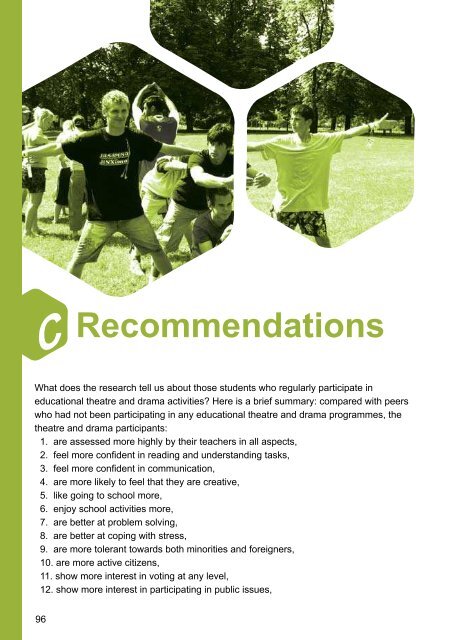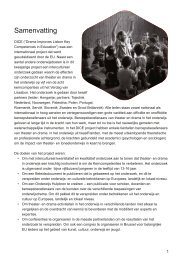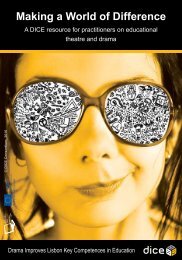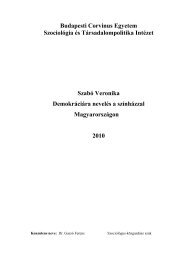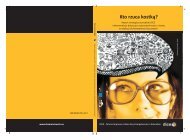Policy Paper - Drama Improves Lisbon Key Competences in Education
Policy Paper - Drama Improves Lisbon Key Competences in Education
Policy Paper - Drama Improves Lisbon Key Competences in Education
Create successful ePaper yourself
Turn your PDF publications into a flip-book with our unique Google optimized e-Paper software.
13. are more empathic: they have concern for others,<br />
14. are more able to change their perspective,<br />
15. are more <strong>in</strong>novative and entrepreneurial,<br />
16. show more dedication towards their future and have more plans,<br />
17. are much more will<strong>in</strong>g to participate <strong>in</strong> any genre of arts and culture, and not just<br />
perform<strong>in</strong>g arts, but also writ<strong>in</strong>g, mak<strong>in</strong>g music, films, handicrafts, and attend<strong>in</strong>g all<br />
sorts of arts and cultural activities,<br />
18. spend more time <strong>in</strong> school, more time read<strong>in</strong>g, do<strong>in</strong>g housework, play<strong>in</strong>g, talk<strong>in</strong>g,<br />
and spend more time with family members and tak<strong>in</strong>g care of younger brothers and<br />
sisters. In contrast, they spend less time watch<strong>in</strong>g TV or play<strong>in</strong>g computer games,<br />
19. do more for their families, are more likely to have a part-time job and spend more<br />
time be<strong>in</strong>g creative either alone or <strong>in</strong> a group. They more frequently go to the<br />
theatre, exhibitions and museums, and the c<strong>in</strong>ema, and go hik<strong>in</strong>g and bik<strong>in</strong>g more<br />
often,<br />
20. are more likely to be a central character <strong>in</strong> the class,<br />
21. have a better sense of humour,<br />
22. feel better at home.<br />
Recommendations<br />
Recommendations<br />
What does the research tell us about those students who regularly participate <strong>in</strong><br />
educational theatre and drama activities? Here is a brief summary: compared with peers<br />
who had not been participat<strong>in</strong>g <strong>in</strong> any educational theatre and drama programmes, the<br />
theatre and drama participants:<br />
1. are assessed more highly by their teachers <strong>in</strong> all aspects,<br />
2. feel more confident <strong>in</strong> read<strong>in</strong>g and understand<strong>in</strong>g tasks,<br />
3. feel more confident <strong>in</strong> communication,<br />
4. are more likely to feel that they are creative,<br />
5. like go<strong>in</strong>g to school more,<br />
6. enjoy school activities more,<br />
7. are better at problem solv<strong>in</strong>g,<br />
8. are better at cop<strong>in</strong>g with stress,<br />
9. are more tolerant towards both m<strong>in</strong>orities and foreigners,<br />
10. are more active citizens,<br />
11. show more <strong>in</strong>terest <strong>in</strong> vot<strong>in</strong>g at any level,<br />
12. show more <strong>in</strong>terest <strong>in</strong> participat<strong>in</strong>g <strong>in</strong> public issues,<br />
The research proves that educational theatre and drama also significantly supports the<br />
targets of the most relevant EU level documents, such as the Europe 2020 strategy.<br />
<strong>Education</strong>al theatre and drama has a significant and objectively measurable impact<br />
on five of the eight key competences: Communication <strong>in</strong> the mother tongue; Learn<strong>in</strong>g<br />
to learn; Interpersonal, <strong>in</strong>tercultural and social competences, civic competence;<br />
Entrepreneurship and Cultural expression. Rais<strong>in</strong>g citizens with educational theatre and<br />
drama <strong>in</strong> the curriculum will result <strong>in</strong>:<br />
• rise <strong>in</strong> the employment rate,<br />
• reduction <strong>in</strong> the number of early school leavers,<br />
• rais<strong>in</strong>g the overall quality of all levels of education and tra<strong>in</strong><strong>in</strong>g,<br />
• stronger synergy between culture and education,<br />
• more active citizens,<br />
• citizens be<strong>in</strong>g more sympathetic towards cultural diversity and <strong>in</strong>tercultural dialogue,<br />
• more <strong>in</strong>novative, creative and competitive citizens.<br />
In contrast, however, <strong>in</strong> many countries educational theatre and drama:<br />
• has low fund<strong>in</strong>g and/or status,<br />
• does not have a place <strong>in</strong> the national curriculum and/or the tertiary education<br />
system.<br />
Hereby, we call on all responsible decision-makers, from school directors to the<br />
Commissioner of the European Union, to work for the <strong>in</strong>clusion of educational theatre<br />
and drama <strong>in</strong> European school curricula, so that it be given the same status as the arts<br />
subjects of music and visual arts. Our field has existed for decades, but its recognition<br />
Recommendations<br />
96<br />
97


